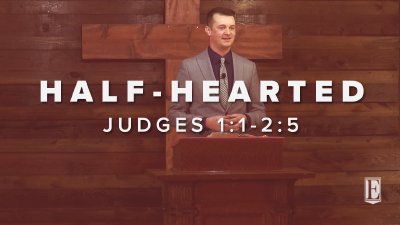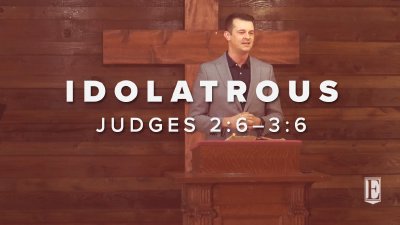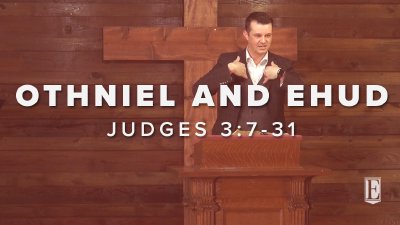OUTLINE
I. You cannot serve the LORD and idols (v.1-6)
II. You cannot trust Jesus and yourself (v.7-13)
III. You cannot love the LORD and money (17:10-11, 18:4-6, 18-20, Matthew 6:24)
IV. If you serve idols or trust yourself or love money, the temporary results will be either 1) empty hands or 2) enslavement. The eternal results will be destruction (ch.18, Philippians 3:18-19)
DISCUSSION
1. Chapter 17 begins showing the depths of Israel’s apostasy. The first section, Judges 17:1–18:31, is an example of their religious corruption. Read verses 1-5. What did Micah confess to his mother? How did his mother respond? What did she do with the silver and who did she dedicate it to? What did Micah do with the carved image? How is this reminiscent of Exodus 32:1-10? How does Exodus 20:4 reveal the foolishness of Micah and his mother? What else stands out to you in these verses and why?
2. Read verses 6-13. How should verse 6 make us long for Jesus? Further evidence is shown here of Israel’s religious corruption. This time it is not a family in general, but a Levite in particular. Why did the Levite become “content to dwell with the man”? Were priests meant to be private servants of families of public servants of the people? What did Micah think would happen now that he had a Levite as his very own priest, according to verse 13?
3. After showing the religious corruption of a family (Micah and his mother) and of a Levite, the narrative now turns to showing the religious corruption of an entire tribe, the Danites. Read verses 1-6. Why were the five Danites spying out and exploring the land? Where was the Danites allotted territory according to Joshua 19:40-47? How does Judges 1:34-35 help us understand why they did not possess an inheritance? Where did they end up finding lodging? What did they ask the Levite to do? Does anything in the text say that the Levite actually inquired of the LORD? How does Jeremiah 10:21 shed light on the stupidity of this kind of promise? What does Jeremiah 10:21 say the results of such stupidity would be?
4. Read verses 7-21. What did the Danites find when they scouted the land of Laish and how did they respond? How should they have responded? What did they end up doing to Micah and the Levite? How did the Levite respond? What else stands out to you in these verses and why?

SHAMELESS: Judges 17-18
Judges 17-18
April 26, 2020 • Brett Baggett
HALF-HEARTED: Judges 1:1–2:5
January 12, 2020 • Brett Baggett
DISCUSSION 1. Read Judges 1 verses 1-7. What do we learn about the period of history in which this book is set, according to verse 1? How does this differ from Joshua chapter 1, which followed the death of Moses? Who did the LORD tell to go up against the Canaanites and who actually went? How does Adoni-bezek respond once they “caught him and cut off his thumbs and his big toes”? What can we learn from all of this? 2. Read verses 8-15. How does Joshua 15:13-19 help tie the book of Joshua and the book of Judges together? How does 1 Samuel 18:25 help us understand what is happening here with Caleb, Achsah, and Othniel? What else stands out to you and why? 3. Read verses 16-36. What had the LORD commanded his people to do in Joshua 6:17 and 11:14? How do these verses help us see the half-hearted obedience of the LORD’S people? 4. Read chapter 2 verses 1-5. Who is “the angel of the LORD” and how can we tell? What did he do? What did he promise? What did he command? What did the people do in response? What did the LORD do in response to their disobedience? How did the people respond to the LORD’S discipline? How does Hebrews 12:3-17 help clarify?
IDOLATROUS: Judges 2:6-3:6
January 19, 2020 • Brett Baggett
DISCUSSION 1. Read verses 6-10. What marked the people of God during the time that Joshua and his fellow elders lived? What happened after the generation of Joshua? How should this sober us as we teach the next generation and make disciples in our day? 2. Read verses 11-15. What are some of the words used to describe what the people of Israel did after the death of Joshua and his generation? What are some of the words used to describe the LORD’S response to their apostasy? *apostasy: “abandonment of former faith.”What is the state of the people of Israel as described in verse 15? How do we see the sovereignty of God in these verses as opposed to a naturalistic view of history? 3. Read verses 16-23. These verses serve as a summary of the entire book of Judges. What did the LORD do in response to the “terrible distress” of the people? What did the people do in response to the LORD sending them Judges to save them? What else stands out to you in these verses and why? 4. Read chapter 3 verses 1-6. Why did the LORD leave the other nations among the people of Israel according to verse 2? Why did the LORD leave the other nations among the people of Israel according to verse 4? Is testing the same thing as tempting? How do James 1:13 and 1 Peter 4:12-13 help clarify?
OTHNIEL AND EHUD: Judges 3:7-31
January 26, 2020 • Brett Baggett
DISCUSSION 1. Read verses 7-11. What does the writer mean when he says “they forgot the LORD”? What do we learn about salvation and God’s grace in this passage? 2. Read verses 12-14. What did the people of Israel do? What did the LORD do in response? 3. Read verses 15-30. What is the significance of Ehud being left-handed (verse 15)? What stands out to you in this passage and why? What should we learn from these verses? 4. Read verse 31. What light does the ESV Study Bible note on Judges 3:31 shed on the identity of Shamgar?







